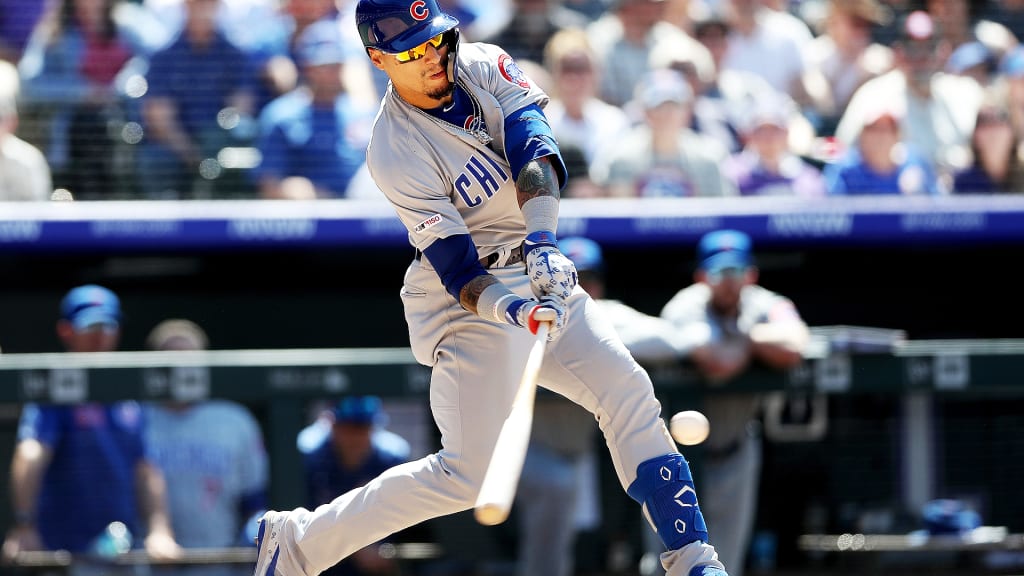
Early in the season, much was made about Cubs hitters successfully using the opposite field. Given some of the recent offensive struggles, do you get a sense that the team is moving away from that? In particular, do you get the feeling that Javier Baez is moving away from that and trying to be a little pull happy? He also seems to be hitting the ball on the ground a lot right now. Is the foot still bothering him?
-- Mike R., Williamsport, Pa.
We'll get to Baez here in a bit, but let's start with the Cubs' opposite-field approach as a whole.
You're correct, Mike. There's been a lot of talk about Chicago's success going the other way dating back to Spring Training, and for good reason. Going into Monday's action, the Cubs' still led the Majors in slugging percentage to the opposite field (.680, per Statcast) by a wide margin. The Brewers ranked second at .572. It has been, and remains, a key element to Chicago's offensive mentality.
That said, you are also right that there has been some diminishing production within that overall showing. For example, let's take a look at the Cubs' average exit velocity on balls hit to the opposite field by month (through Sunday):
March/April: 87.6 mph
May: 86.5 mph
June: 84.1 mph
According to FanGraphs, the Cubs' ground-ball rate on balls hit the other way has gone from 19.2% (March/April) to 21% (May) to 27.1% (June). The overall rate of balls hit to the opposite field is roughly the same in June (28.3%) in comparison to March/April (28%), but the quality of contact is what has driven some of the production down of late.
Per Statcast, here's a look at the monthly slugging percentage to the opposite field, with expected slugging in parentheses:
March/April: .667 SLG (.607 xSLG)
May: .757 SLG (.614 xSLG)
June: .575 SLG (.512 xSLG)
Given that Chicago has outperformed its expected slugging each month, it makes sense that some regression has taken place. Plus, all that success in the first six weeks surely led to an adjustment on the part of opposing pitchers. That certainly looks like the case when it comes to Baez, whose opposite-field rate has dropped each month (36.1% in March/April, 31.3% in May and 26.7% in June).
Baez's right heel, which flared up last month, may not be at 100%, but the shortstop insists it does not impact him in the batter's box. We can only take him at his word, but his downturn in production has lined up with when the problem came up. Dating back to May 18 -- one day before the heel pain forced Baez out of a game in Washington -- he's hit .212/.241/.423 for the Cubs. He was batting .330/.370/.615 prior to that.
Getting Craig Kimbrel was fantastic for the Cubs' bullpen, but I still think more is needed to really strengthen the late innings. Do you think the Cubs will go after a left-handed reliever before the Trade Deadline?
-- Nick B., Schaumburg, Ill.
Cubs president of baseball operations Theo Epstein said this past weekend that the front office will remain "proactive" when it comes to canvassing the market for more reinforcements. While Epstein has not come right out and said that lefty relief help is the goal, it's pretty easy to examine the makeup of the bullpen and come to that conclusion. So, yes, I do think the Cubs will try to add an impact lefty before July 31.
This weekend in L.A., Dodgers slugger Cody Bellinger really highlighted that need by going 5-for-7 with three home runs and two walks against Cubs lefties (starters and relievers). Come postseason time, Chicago will want to know it has the kind of shutdown lefty who can equalize some of the big bats that will be on the October stage.
Entering Monday, Chicago's left-handed relievers had allowed a .343 average (27th in MLB) and .412 wOBA (28th) against left-handed batters this season. They also ranked 22nd in walk rate (12.2%), 24th in strikeout rate (19.1%) and 30th in WHIP (2.15).
Some left-handed relievers whose names will probably pop up in the weeks leading up to the Deadline include Jake Diekman, Sean Doolittle, Brad Hand, Will Smith and Tony Watson, among others.
Over the weekend, Theo said there were some "new rules" in place that would impact the Trade Deadline. What are the changes to which he was referring?
-- Todd, Fishers, Ind.
For background, here is the Epstein quote that Todd is referencing:
"We'll continue to try to stay proactive. It's very competitive out there. We'll see. Long way to go before the end of July. New rules this year, too. That'll probably make for a higher volume across the industry, even if they're a lot of small deals, too."
Epstein was referring to the elimination of the August waiver trading period. In previous years, deals could still be made in August, but the trades would either happen after a player cleared waivers or between teams when a player was claimed off waivers. Now, there is only one Trade Deadline on July 31 with no waiver rules impacting deals.
Without an additional month to try to tweak a roster for the postseason via external help, teams will have to make the call to buy or sell in the weeks leading up to July 31. That means needs will have to be addressed earlier, or teams will have to be more aggressive in filling perceived needs for down the stretch and into October. That is one reason why Epstein predicted there could be an increase in smaller deals, along with the blockbuster trades that hog the headlines.
Do you agree that the starting pitchers need to step up their performance whether they're playing at the Friendly Confines of Wrigley Field or on the road?
-- Ken H., Northbrook, Ill.
Definitely. While the last two games in Los Angeles featured a stellar performance by Yu Darvish and a decent showing from José Quintana, the rotation's numbers on the road so far this year leave something to be desired.
Cubs starters have a 2.93 ERA at Wrigley and a 4.62 ERA away from home. The 49% ground-ball rate by the starters at home is tops in the Majors. That rate slides to 43.7% on the road. The group has a 3.38 FIP at home and a 4.70 FIP on the road. There's also a big gap in wOBA (.280 at home/.325 on road), homer-to-flyball rate (10.7% at home/15.8% on road) and opposing slugging percentage (.356 at home/.437 on road).
In my opinion, the Cubs' bench is lacking. While Victor Caratini has done well as the backup catcher, Daniel Descalso seems to have lost the confidence of manager Joe Maddon. And I think Addison Russell needs to either play every day or be sent down. Do you think the Cubs need a more reliable pinch-hitter?
-- Doug, Sun City Center, Fla.
A more reliable pinch-hitter like, say, Tommy La Stella? What a year he's having for the Angels. Moving on, though ...
The Descalso situation has definitely thrown a wrench into the bench plan. I wouldn't say he's lost Maddon's confidence, though. Just Sunday, the manager had this to say when asked about the veteran utility man:
"This guy is an absolute professional. I've talked to him and I believe this, and I've told him straight up, I said, 'By the end of the year, you're going to be really important to us and you're going to feel that thing at the plate again and you're going to start hitting. You're going to start contributing again. Just please stay solvent and know that I know this also.'"
Given Descalso's performance in recent years, it's hard to think he will keep batting .101 with a .373 OPS (like he has in 79 at-bats since April 25). Russell has been struggling offensively as well, but Maddon really likes the defensive dynamic up the middle with him at second and Baez at short. That is why David Bote isn't playing second exclusively. He has to be worked in at third to stay in the mix regularly.
Entering Monday, the Cubs had a .599 OPS and 65 wRC+ (35% below average) in pinch-hitting situations. Yes, that needs to improve. One would think Descalso would be due for improving in those moments as the season wears on. If Carlos Gonzalez doesn't get on track as part of the outfield rotation, Chicago might also consider pulling the trigger on bringing Ian Happ back up from Triple-A to shore up the reserve options.


